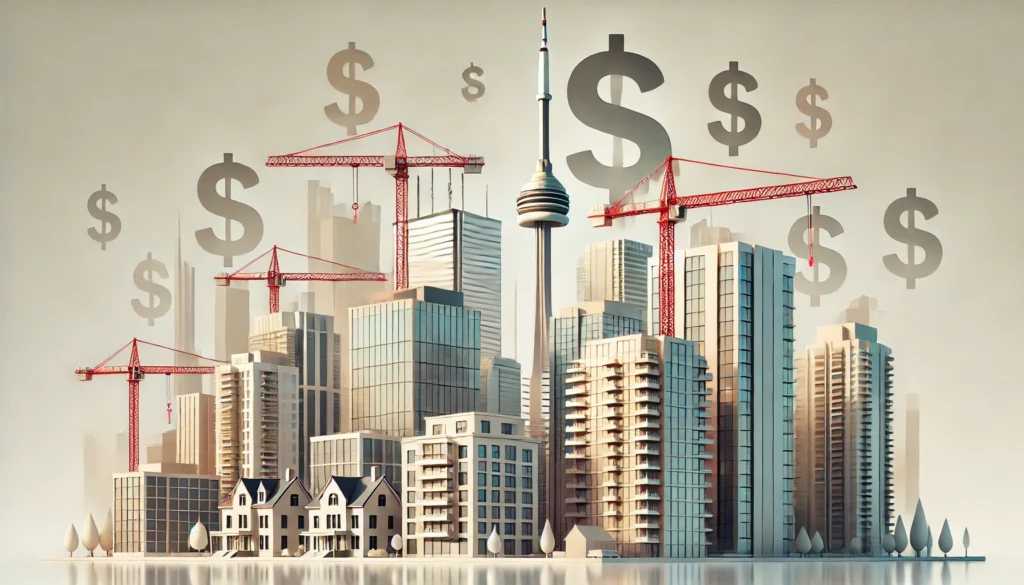The recent announcement of Trump’s 25% tariff on all Canadian goods is poised to have far-reaching implications, extending well beyond trade and manufacturing into sectors like real estate. Toronto, as Canada’s largest housing market, is particularly susceptible to the ripple effects of such sweeping trade policies. With the city’s housing market already navigating affordability challenges and supply constraints, this tariff introduces a significant variable that could reshape its future dynamics.
Understanding the Trump’s 25% Tariff and Its Broad Implications
On January 20, 2025, a 25% tariff on all Canadian goods imported into the U.S. will come into effect as part of Trump’s broader economic policy aimed at addressing perceived trade imbalances and illegal immigration concerns. While the move is aimed at protecting U.S. domestic industries, it has caused immediate ripple effects across the Canadian economy.
The Canadian dollar has already weakened, and industries relying on U.S. exports are bracing for reduced competitiveness. These factors could undermine consumer confidence and purchasing power, both of which are critical to Toronto’s real estate market.
Rising Construction Costs: The First Shockwave
Toronto’s construction sector, heavily reliant on imported materials such as steel, aluminum, and timber, stands to face significant cost pressures. The 25% tariff will make sourcing these materials from the U.S. substantially more expensive. While developers can pivot to domestic suppliers, Canada’s production capacity is insufficient to meet the robust demand of Toronto’s booming housing market.
- Steel and Aluminum Costs: Essential for high-rise condominium construction, these materials are likely to see significant price increases, leading to higher project costs.
- Lumber Prices: Already volatile due to supply chain disruptions during the pandemic, lumber prices may climb further as developers look to alternative suppliers.
- Labour Costs: Any increase in material costs often translates into longer timelines, which drive up labour costs as well.
Trump’s 25% Tariff Impact on Housing Prices
With construction costs rising, developers may pass these additional expenses onto buyers, leading to higher housing prices. This could exacerbate Toronto’s existing affordability crisis. The effects might include:
- Higher New Home Prices: Newly constructed homes are expected to carry a premium to offset increased development costs.
- Appreciation of Resale Properties: As the supply of new builds diminishes, resale homes may see upward price pressure due to heightened demand.
- Decreased Affordability: First-time buyers, already struggling with high prices and rising interest rates, may find homeownership even more elusive.
This dynamic could lead to slower sales in both the new and resale housing markets, particularly for mid-range and luxury properties.
Challenges for Foreign Investors
Toronto has long been a magnet for foreign investors seeking stable returns in real estate. However, Trump’s 25% tariff introduces uncertainties that could dampen investor enthusiasm:
- Currency Fluctuations: The weakening Canadian dollar could make investments less appealing, especially when coupled with higher import costs.
- Higher Development Costs: Foreign developers may reconsider entering the Toronto market due to escalating construction costs and regulatory hurdles.
- Trade Uncertainty: Ongoing trade disputes could discourage international investors seeking stability.
The combined effect could be a reduction in foreign capital inflows, potentially cooling the market in areas that rely heavily on international investment, such as high-end condominiums.
Potential Retaliatory Actions and Their Effects
Canada is likely to respond with retaliatory tariffs, further straining the economic relationship between the two countries. For the real estate sector, this could mean:
- Increased Prices for Imported Goods: Developers reliant on cross-border supply chains may face higher costs on multiple fronts.
- Supply Chain Disruptions: Retaliatory measures could cause delays in securing essential construction materials.
- Economic Uncertainty: Prolonged trade disputes could undermine economic growth, reducing demand for housing in the long term.
This cycle of retaliatory tariffs could result in prolonged uncertainty, making it challenging for developers and investors to plan effectively.
Broader Economic Impacts on Toronto’s Real Estate Market
Beyond direct costs, the 25% tariff may have secondary economic impacts that influence Toronto’s real estate market:
- Reduced Consumer Spending: Higher costs for goods and services could strain household budgets, leaving less disposable income for home purchases.
- Economic Slowdown: Industries reliant on U.S. exports, such as automotive and manufacturing, may experience reduced profitability, leading to job losses.
- Rising Interest Rates: If inflation spikes due to increased costs, the Bank of Canada may raise interest rates further, adding another barrier to affordability.
Strategies for Navigating Trump’s 25% Tariff Impact
Despite these challenges, stakeholders in Toronto’s real estate market can take proactive measures to mitigate the effects of the tariff:
- Diversify Supply Chains: Developers should explore sourcing materials from other countries, such as Mexico or within Canada, to reduce dependence on U.S. imports.
- Emphasize Cost-Efficiency: Utilizing advanced building technologies, modular construction methods, and energy-efficient designs can help offset rising costs.
- Stay Informed: Monitoring policy developments and market trends will be crucial for making informed decisions.
- Advocate for Industry Support: Engaging with industry associations to lobby for government incentives or subsidies can provide much-needed relief.
By adopting these strategies, Toronto’s real estate stakeholders can position themselves to weather the challenges posed by Trump’s 25% tariff.
Looking Ahead
While the full effects of Trump’s 25% tariff on Toronto’s real estate market will take time to materialize, the early indicators point to significant challenges. Rising costs, reduced investment, and economic uncertainty will likely shape market conditions over the next several years. However, with strategic planning and adaptability, the city’s real estate sector can continue to thrive, even in the face of these unprecedented challenges.



